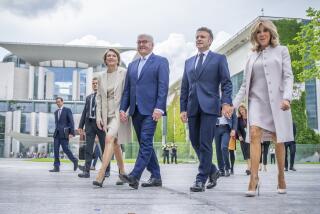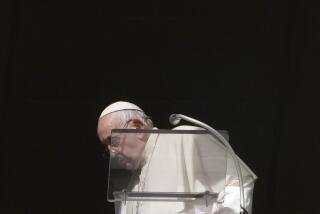Stresses Moral Forces as He Ends W. German Tour : Pope Calls for Unity for All Europeans
- Share via
AUGSBURG, West Germany — Pope John Paul II ended his second pastoral visit to West Germany on Monday by calling for the union of divided Christian churches and for “a new united Europe from the Atlantic to the Urals.”
In a series of farewell speeches in this small, historic city, which figured prominently in the Protestant Reformation, and in Speyer, the burial place of German emperors, the pontiff linked the prospect of a free and united Europe with a Christian unity that would bring moral and religious forces to European governments, East and West.
“Today, more and more people are having misgivings about man’s moral and religious non-commitment in an increasingly secularized society,” he said, “and see this as the road to failure and chaos.”
Warning that people must serve God “voluntarily, not under compulsion,” he said it is this principle and “not police or military authority, not dictatorial measures, that is able to resolve fundamental issues, remove anxieties and establish an equitable social order.”
“Only on this basis,” he said, “will it be possible to overcome the menacing international confrontations of states and alliances and to create a new united Europe from the Atlantic to the Urals.”
He continued, “Christian roots in Europe, world peace, the reunification of Christians--these are all major challenges of our times,” and he urged individuals to “promote both in the church and in society radical change for the better.”
Calling for a universal search “for the pure water of truth and justice,” he added: “Can this call really have faded away owing to the apparent self-sufficiency and satiation of many of today’s Europeans in their constant temptation to live as if there were no God?”
At the official departure ceremony before the Pope left for Italy aboard a special Lufthansa flight, Chancellor Helmut Kohl thanked John Paul for honoring two Nazi-era victims, Jewish-born nun Edith Stein and Jesuit priest Rupert Mayer. Both were beatified as a last step before sainthood.
Ecumenical Gathering
Kohl also thanked the Pope for meeting with Jewish leaders, saying the contacts were especially important because of Germany’s “horrible history this century.”
John Paul told an ecumenical gathering of Protestant and Greek Orthodox leaders at the 11th-Century Basilica of Saints Ulrich and Afra in Augsburg: “The spirit of truth can lead to every truth. The spirit of love can overcome any separation. Let us give thanks for all the steps that have brought us closer to greater unity in recent years.”
He observed that Martin Luther and Roman Catholic Cardinal Cajetan met nearby in 1518 in an attempt to resolve the differences that triggered the Reformation. “What would have happened,” he asked, “if their talks had ended in a renewed, deepened and strengthened unity of the church?”
In a rare forecast of success for the ecumenical movement between Catholics and Protestants, he told Kohl in a farewell speech at Speyer, “I am firmly convinced that the vexation of denominational division can, with the necessary patience and endurance, gradually be overcome.”
He appeared to pledge his own best efforts to keep the dialogue of church unification as free of conflict as possible, saying, “On this laborious road to unity we shall defend and esteem all that the divided Christians still have in common and avoid everything that might again deepen the rift.”
The pastoral visit to West Germany was John Paul’s 34th papal trip outside Italy. His first to West Germany was in November, 1980.
More to Read
Sign up for Essential California
The most important California stories and recommendations in your inbox every morning.
You may occasionally receive promotional content from the Los Angeles Times.









